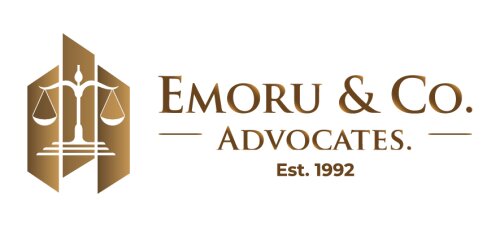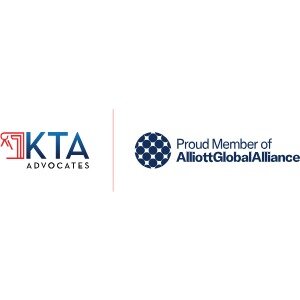Best Sanctions & Export Controls Lawyers in Uganda
Share your needs with us, get contacted by law firms.
Free. Takes 2 min.
Or refine your search by selecting a city:
List of the best lawyers in Uganda
About Sanctions & Export Controls Law in Uganda
Sanctions and export controls are areas of law that regulate the transfer of goods, technology, services, and payments across borders for reasons such as national security, foreign policy, and compliance with international obligations. In Uganda, this legal framework ensures that exports comply with both local legislation and international commitments, including those imposed by the United Nations or regional communities. Authorities monitor certain goods and activities to prevent illegal trade, protect national interests, and enforce bans on interactions with sanctioned countries, organizations, or individuals.
Why You May Need a Lawyer
Navigating Uganda’s sanctions and export controls can be complex, especially if your business involves cross-border trade, technology transfers, or financial transactions with foreign entities. You may require legal assistance in situations such as:
- Seeking export licenses or permits for controlled goods or technologies
- Responding to investigations by customs or regulatory agencies regarding alleged non-compliance
- Understanding which goods, services, or destinations are subject to sanctions
- Performing due diligence on foreign clients, suppliers, or partners
- Negotiating contracts that involve the transfer of sensitive products or information
- Challenging administrative or criminal enforcement actions
- Developing internal compliance programs for your business
Lawyers specializing in this field can help you interpret the law, prepare documentation, and represent you in dealings with regulators or courts.
Local Laws Overview
Uganda’s legal landscape for sanctions and export controls is shaped by several key statutes and regulations. The primary legislation includes:
- The East African Community Customs Management Act: This act governs the movement of goods within and outside the East African Community, imposing controls on restricted and prohibited exports.
- The Anti-Money Laundering Act: Implements controls on financial transactions that could violate international sanctions or support prohibited activities.
- The Firearms Act, Explosives Act, and related laws: Place strict controls on the export and import of arms and dual-use goods.
- International Treaties and Commitments: Uganda enforces United Nations Security Council sanctions and complies with agreements from regional blocs like COMESA and the African Union.
The Uganda Revenue Authority, together with the Ministry of Trade, Industry, and Cooperatives, regulates exports and ensures compliance with applicable control lists. Violations can result in the seizure of goods, administrative fines, license revocations, or criminal prosecution.
Frequently Asked Questions
What are export controls?
Export controls are legal measures that restrict or regulate the export of certain goods, technologies, and services for reasons such as security, foreign policy, and compliance with international obligations.
What is a sanction?
A sanction is a ban or restrictive measure imposed by the government on individuals, countries, or entities, which prohibits or limits certain transactions, such as trade, investment, or financial transfers.
Who enforces sanctions and export controls in Uganda?
The Uganda Revenue Authority, the Ministry of Trade, and other sector-specific regulators enforce these laws, often in cooperation with law enforcement agencies.
Do I need a license to export goods from Uganda?
Some goods do not require special permits, but items on restricted or controlled lists (such as military equipment, chemicals, or dual-use goods) generally need export licenses issued by the relevant authorities.
How do I know if a product is subject to export controls?
Refer to the national control lists maintained by the Uganda Revenue Authority, check international obligations, or consult with a legal specialist to determine if your goods require special authorization.
What should I do if I accidentally violate sanctions laws?
Contact a lawyer immediately to review your case, advise you on disclosure obligations, and represent you during interactions with regulators or enforcement officers.
Are there penalties for non-compliance?
Yes, penalties can include fines, imprisonment, seizure of goods, loss of business licenses, and blacklisting for continued violations.
Can individuals be personally liable, or is it only companies?
Both individuals and companies can be held liable for violations, including directors, officers, and employees involved in decision-making or operational processes.
How do sanctions relate to financial transactions in Uganda?
Sanctions can prohibit or restrict financial dealings with certain countries, entities, or individuals. Banks and financial institutions are required to screen transactions and report any suspicious activity under the Anti-Money Laundering Act.
Where can I get more information about Uganda’s sanctions and export control laws?
Government bodies, official gazettes, and legal professionals are primary sources. See additional resources below for more guidance.
Additional Resources
If you need authoritative information or assistance, consider contacting the following:
- Uganda Revenue Authority (URA): For export permit requirements, customs controls, and advice on restricted goods.
- Ministry of Trade, Industry, and Cooperatives: For guidance on export regulations and policy.
- Ministry of Foreign Affairs: For international sanctions and embargo information.
- Uganda National Bureau of Standards (UNBS): For conformity assessment of products and export certification.
- Registered Ugandan legal practitioners and law firms specializing in international trade: For legal advice tailored to your specific needs.
Next Steps
If you require legal support with sanctions and export controls in Uganda, follow these steps:
- Identify your particular area of concern, whether it is obtaining a license, responding to enforcement actions, or understanding compliance obligations.
- Gather all relevant documents, such as contracts, shipping records, notifications from authorities, and business correspondence.
- Contact a qualified Ugandan lawyer or law firm with expertise in sanctions and export controls. Schedule a consultation to discuss your situation.
- Follow legal advice carefully and maintain clear communication with your legal representative throughout the process.
- Stay informed about updates in laws and regulations by subscribing to official bulletins or consulting recognized local legal sources.
Taking early and informed action can help you minimize risks, avoid costly penalties, and ensure your business complies with Ugandan and international requirements.
Lawzana helps you find the best lawyers and law firms in Uganda through a curated and pre-screened list of qualified legal professionals. Our platform offers rankings and detailed profiles of attorneys and law firms, allowing you to compare based on practice areas, including Sanctions & Export Controls, experience, and client feedback.
Each profile includes a description of the firm's areas of practice, client reviews, team members and partners, year of establishment, spoken languages, office locations, contact information, social media presence, and any published articles or resources. Most firms on our platform speak English and are experienced in both local and international legal matters.
Get a quote from top-rated law firms in Uganda — quickly, securely, and without unnecessary hassle.
Disclaimer:
The information provided on this page is for general informational purposes only and does not constitute legal advice. While we strive to ensure the accuracy and relevance of the content, legal information may change over time, and interpretations of the law can vary. You should always consult with a qualified legal professional for advice specific to your situation.
We disclaim all liability for actions taken or not taken based on the content of this page. If you believe any information is incorrect or outdated, please contact us, and we will review and update it where appropriate.
Browse sanctions & export controls law firms by city in Uganda
Refine your search by selecting a city.
















